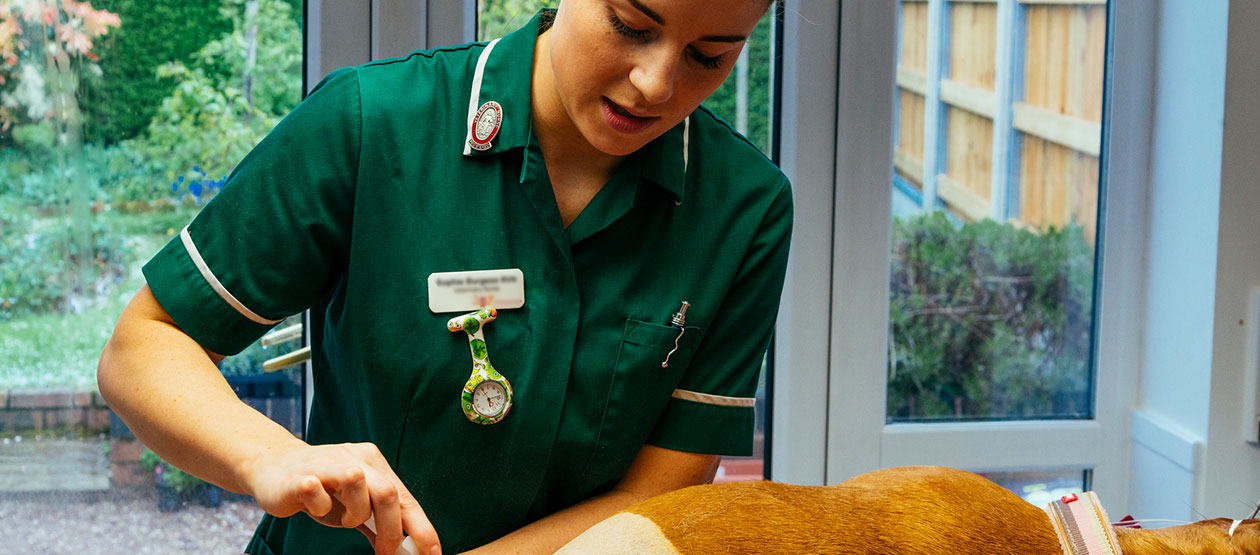
Veterinary nurses are one of two critical professional positions in animal medicine, the other being veterinary surgeons. To become a veterinary nurse, you must have completed a Royal College of Veterinary Surgeons-approved course (RCVS).
As a veterinary nurse apprentice, you’ll help give hands-on nursing care to various animals, including emergency and routine care. In addition, you’ll work alongside veterinary surgeons to promote animal health and wellbeing via responsible ownership and contribute to pet owner education.
Responsibilities
Throughout your apprenticeship, you may help:
- keep the practice and equipment clean and hygienic
- prepare animals for treatment and assist vets during procedures
- give injections, medication and remove stitches
- take x-rays
- take care of in-patient animals
- support and talk to pet owners about treatment and care of their animals
- do reception and administrative duties.
Salary
- An apprentice veterinary nurse can earn £18,000.
- With up five years’ experience salaries range from £20,388 to £23,550.
- More senior veterinary nurses can earn up to £38,600, with the average salary being around £26,000.
Working hours
You’ll work 39 to 49 hours each week as a full-time veterinary nurse. However, depending on your job, you may work longer hours. Also, remember that you could be required to work unsociable hours, such as weekends, bank holidays, and perhaps overnight cover.
Part-time and locum (temporary) positions are also available in this profession.
Working environment
You may work in a vet clinic or an animal care organisation.
Your job may be physically and emotionally demanding.
A uniform, as well as protective clothing, may be necessary.
Qualifications
Qualifications you can achieve as an apprentice veterinary nurse include:
Level 3 Veterinary Nurse – Entry requirements for this level include 4 or 5 GCSEs at grades 9 to 4 (A* to C), or equivalent, including English, maths and science. This qualification takes on average 30 months to complete.
Skills
On a veterinary nurse apprenticeship, you’ll learn:
- customer service skills
- knowledge of animal health
- the ability to work well with others
- knowledge of biology
- the ability to work well with your hands
- patience and the ability to remain calm in stressful situations
- excellent verbal communication skills
- to be thorough and pay attention to detail
- to be able to use a computer and the main software packages competently.
Employers
Most veterinary nurses work for private, corporate-owned, or nonprofit veterinary clinics. Other employers offer emergency care or specialise in referral situations.
Some veterinary nurses work at animal shelters and charitable organisations. Outside the practice, other occupations include teaching, research, animal rehabilitation, and military service.
Professional development
Once qualified, you may register with the RCVS as a registered veterinary nurse (RVN). CPD is essential for keeping your RCVS registration current; you must complete 15 hours of CPD each calendar year.
CPD activities include attending training courses, seminars, and lectures, being mentored in your career, and doing research or critical reading of relevant publications. RCVS Continuing Professional Development has further information.
Membership in the British Veterinary Nursing Association (BVNA) entitles you to continue education, seminars, and events, as well as a monthly professional journal and an advice hotline.
Postgraduate options are also available, depending on your interests and objectives.
As a certified and registered veterinary nurse, you may pursue further certifications such as the RCVS’s Graduate Certificate in Advanced Veterinary Nursing or Postgraduate Certificate in Advanced Veterinary Nursing.
Career prospects
You might work as a clinical coach, practising, assisting and encouraging student veterinary nurses to strengthen their clinical expertise. Finally, you might proceed to the head nurse role, contributing to the development of a whole nursing team.
There are ways to further your career and specialise depending on your practice and interests. For example, you may specialise in anaesthesia, rehabilitation, ward care, or diagnostics as part of your referral practice. Aside from animal-related jobs, there are possibilities to progress and specialise in managerial positions such as practise manager.
Aside from practice, you might work in education, teaching veterinary nurses or speaking on animal management courses. In addition, research opportunities in the pharmaceutical or nutritional industries may arise depending on your qualifications.
